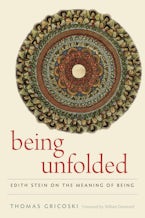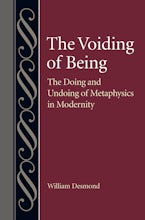- Home
- Studies in Philosophy and the History of Philosophy
- philosophy
- The Intimate Strangeness of Being
Preparing your PDF for download...
There was a problem with your download, please contact the server administrator.
The Intimate Strangeness of Being
Metaphysics after Dialectic
Studies in Philosophy and the History of Philosophy
Imprint: Catholic University of America Press
This book explores the contested place of metaphysics since Kant and Hegel, arguing for a renewed metaphysical thinking about the intimate strangeness of being. There is a mysterious strangeness to being at all, and yet there is also something intimate. Without the intimacy, argues William Desmond, we become strangers in being; without the mystery, we take being for granted. The book locates the origin of metaphysics' contested place in recessed equivocations in Kantian critique and Hegelian dialectic, equivocations that keep from view the more original sources of metaphysical thinking. It takes issue with contemporary claims about the "overcoming of metaphysics" associated with Heidegger, the "deconstruction of metaphysics" associated with Derrida, as well as with claims that a new "post-metaphysical thinking" is necessary.
The book begins with an exploration of the status of metaphysics in light of equivocations in Hegelian dialectic. It then offers an assessment of metaphysics in light of critique and deconstruction. Finally, it proposes an affirmative rethinking of the constant perplexities of being in terms of a metaxological metaphysics. This metaphysics involves a thinking of the between (metaxu ) that characterizes Desmond's singular approach, and that he also has distinctively developed in his other works. Addressing the problematic state of metaphysics in recent centuries, this metaxological metaphysics tries to be true to both the strange mystery and the intimacy, to be faithful to the constant perplexities of being, and to recuperate appreciatively some of the rich resources of the longer philosophical tradition.
William Desmond is currently professor of philosophy at Katholieke Universiteit Leuven as well as David Cook Visiting Chair at Villanova University. He is the author of many books, including Being and the Between (winner of the Prix Cardinal Mercier and the J.N. Findlay Award for best book in metaphysics, 1995-1997); Is There a Sabbath for Thought?: Between Religion and Philosophy; and God and the Between. He has also edited five books and published more than 80 articles. He is past president of the Hegel Society of America, the Metaphysical Society of America, and the American Catholic Philosophical Association.
"Throughout his distinguished philosophical career, Desmond has shown the ability to ramify and refresh the major features of his analysis of the everyday as well as his critique of the modern philosophical tradition. This book is no exception."
~Thomist
"This book is an important marker on William Desmond's remarkable and stimulating philosophical journey. It is a nuanced and forceful defence of the metaphysical as a fundamental mode of human experience and expression."
~American Catholic Philosophical Quarterly



